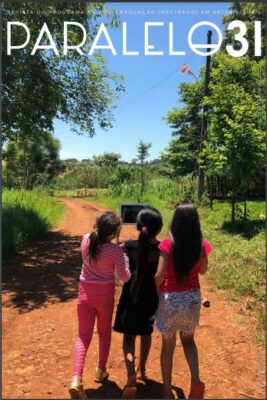Um jogo cooperativo artístico. A experiência do descaminhar em Salvador
Resumo
Tendo psicogeografia e a arte de andar como ponto de partida, produzimos um jogo de tabuleiro artístico de criação colaborativa. O jogo é baseado na experiência de mover-se por um lugar, neste caso, a cidade de Salvador, e sentir seu ambiente. É um jogo de arte baseado na colaboração, no vagar e no experimentar a cidade como arte, como jogo. Trata-se da topofilia difundida por Yi-Fu Tuan (1990), de apreciar o lugar, amando-o. Diferente de uma mera contemplação do lugar, este jogo pretende levantar questões de mobilidade, urbanismo, ambiente, estética e poluição.
Palavras-chave: Caminhada; Cidade; Arte; Salvador; Jogo.
A Cooperative Art Game. The Experience of Wandering in Salvador.
Abstract: Having psychogeography and the art of walking as a starting point, we created a collaborative artistic board game. The game is based on the experience of moving around a place, in this case, the city of Salvador, and getting a feeling for its environment. It's an art game based on collaboration, wandering and experiencing the city as art, as a game. It is about the topophilia disseminated by Yi-Fu Tuan (1990), about appreciating the place, loving it. Different from a mere contemplation of the place, this game intends to raise questions of mobility, urbanism, environment, aesthetics and pollution.
Keywords: Walk; City; Art; Salvador; Game.
Referências
ADAMS, E. Postmodernism and the three types of immersion. Disponível em:<http://www.designersnotebook.com/Columns/063_Postmodernism/063_ postmodernism.htm>. Acesso em: 3 mar. 2019.
AXELROD, R. M. The complexity of cooperation: agent-based models of competition and collaboration. Princeton, N.J.: Princeton University Press, 1997.
BINMORE, K. Playing for real: A text on game theory. New York: Oxford University Press, 2007.
CARERI, F. Walkscapes: O caminhar como prática estética. São Paulo: G. Gili, 2016.
COVERLEY, M. A arte de caminhar. O Escritor Como Caminhante. São Paulo: Martins Fontes - Selo Martins, 2015.
FEIOCK, R. C. Metropolitan governance: conflict, competition, and cooperation. Washington, D.C.: Georgetown University Press, 2004.
FROCK, C. Unexpected art. Serendipitous installations, site-specific works, and surprising interventions. San Francisco: Chronicle Books, 2015.
HARDIN, R. Collective action. Baltimore: Published for Resources for the Future by the Johns Hopkins University Press, 1982.
HARMON, K. A. The map as art: contemporary artists explore cartography. New York: Princeton Architectural Press, 2009.
HEAP, S. H.; VAROUFAKIS, Y. Game theory: a critical text. 2nd. ed. New York: Routledge, 2004.
INGOLD, T. O Dédalo e o labirinto: caminhar, imaginar e educar a atenção. Horizontes Antropológicos, v. 21, n. 44, p. 21–36, 2015.
INGOLD, T.; VERGUNST, J. L. Introduction. In: INGOLD, T.; VERGUNST, J. L. (Eds.) . Ways of walking: Ethnography and practice on foot. Burlington: Ashgate Publishing, 2008.
IQBAL, M.; RIZWAN, M. Application of 80/20 rule in software engineering waterfall model. Karachi, Pakistan: IEEE, 2009.
KIREMIRE, A. R. The application of the Pareto principle in software engineering. p. 1–12, 2011.
KAUL, I.; GRUNBERG, I.; STERN, M. A. Global public goods: international cooperation in the 21st century. New York: Oxford University Press, 1999.
KOCH, R. The 80/20 principle: the secret of achieving more with less. New York: Doubleday, 1998.
KOLLOCK, P.; SMITH, M. Managing the virtual commons: Cooperation and conflict in computer communities. Disponível em:<http://research.microsoft. com/~masmith/Vcommons.htm>.
KRAUS, K. A beleza é questão de experiência. In: LANUSSI PASQUALI (Ed.). Arte como jogo. Salvador: Blade, 2015.
LIENHARD, J. H. The Subtle Texture of Cooperation. Disponível em: .
MOGEL, L.; BHAGAT, A. An Atlas of Radical Cartography. Los Angeles, CA: Journal of Aesthetics & Protest Press, 2008.
MONTEIRO, V. H.; RANOYA, G. A Narrativa Do Xadrez: Um Projeto De Jogo Imersivo Narrativamente. Anais do 11o Congresso Brasileiro de Pesquisa e Desenvolvimento em Design, v. 1, p. 1236–1245, 2014.
OSBORNE, M. J. An introduction to game theory. New York: Oxford University Press, 2004.
PERAN, M. Post-it city: ciutats ocasionals. Barcelona: Centre de Cultura Contemporànea de Barcelona, 2008.
RHEINGOLD, H. Smart mobs: the next social revolution. Cambridge, MA: Perseus Pub., 2002.
SOLNIT, R. A história do caminhar. São Paulo: Martins Fontes, 2016.
TUAN, Y.-F. Topophilia: a study of environmental perception, attitudes, and values. New York: Columbia University Press, 1990.
TUOMELA, R. Cooperation: a philosophical study. Dordrecht ; Boston: Kluwer Academic Publishers, 2000.
VENTURELLI, S. Arte: Espaço_Tempo_Imagem. Brasília: Editora Universidade de Brasília, 2004.
WRIGHT, R. Nonzero: The Logic of Human Destiny. New York: Knopf Doubleday Publishing, 2001.
WILDAVSKY, A. B.; CHAI, S.-K.; SWEDLOW, B. Culture and social theory. New Brunswick, N.J.: Transaction Publishers, 1998.
Os autores de trabalho(s) submetido(s) à Paralelo 31 autorizam sua publicação em meio físico e eletrônico, unicamente para fins acadêmicos, sem fins lucrativos ou custo, podendo ser reproduzidos desde que citada a fonte (Paralelo 31). Os mesmos, atestam sua orignalidade, autoria e ineditismo.
data de submissão
Declaration of Copyright
The author presents his/her submission to the periodical Paralelo 31 authorize(s) publication in physical and electronic media, solely for academic purposes, at no cost to the publisher, are aware that future citations of the work are permitted as long as Paralelo 31 is cited as primary source. The authors also attest that the work has never been published and is an original work by the stated author(s). (data de submissão)


 Paralelo 31 ISSN 2358-2529
Paralelo 31 ISSN 2358-2529 
